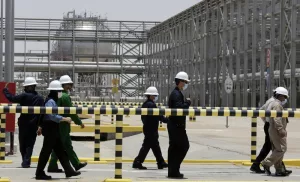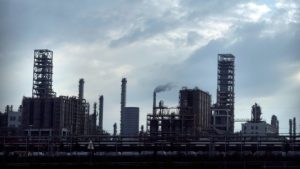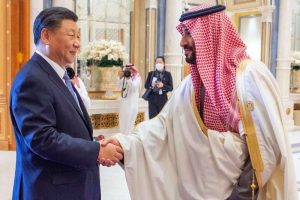Crude storages post Ukraine Conflict
The Saudi petrochemical conglomerate Aramco has recently made two strategic ventures with its biggest client.Rongsheng is China’s largest integrated refining and chemicals facility and the controlling owner of Zhejiang Petrochemical Corp (ZPC) and a huge manufacturer of polyesters .Aramco will supply ZPC with petrochemical feedstocks of naphtha and paraxylene being the raw material for synthetic fibres and plastic bottles.The agreement envisages a 20 year supply of an annual 800,000 tonnes of plastic raw materials polyethylene and polypropylene. Russia after being denied access to Europe’s market for export of its crude after sanctions were imposed when it invaded Ukraine started supply of crude to China at discounted rates. This set alarm bells ringing in the Kingdom of Saudi Arabia as China is its biggest oil client.
 Credit AP News
Credit AP News
ZPC is the operator of China’s largest refinery which can process upto 800,000 barrels per day and produces 4.2 million metric tonnes of ethylene annually. The ZPC will provide Aramco about 18.6 million barrels of storage space in China’s eastern port of Zhoushan and Aramco will maintain a minimum crude storage level of 11 million barrels.
Petrochemicals under threat
 Credit CTV News
Credit CTV News
Aramco which is Saudia’s state owned company and the largest exporter of crude will this year commence construction of a major integrated refinery and petrochemical complex in a north eastern port in China as a joint venture. This venture will supply 210,000 barrels per day of crude from Aramco which will retain a 30 % interest and is likely to become operational by 2026. Saudi Aramco has upped its financial stakes in the Far East with multi-billion dollar investments in China. Plans are being operationalised by upgrading a planned joint venture in northeast China and the petrochemical complex will include an ethylene cracker and a large p-xylene facility . The price tag for this complex is $ 12.2 billion.
Diversifying Economic partners
 Credit The Arab News
Credit The Arab News
The extent to which Aramco is extending its global crude oil storage and branching out into the petrochemical sector is visible when it broke ground on a $ 7 billion project to produce petrochemicals from crude oil at its South Korean affiliate S-Oil Corp’s refining complex in Korea’s port city of Ulsan.Aramco recorded huge revenues of $ 161 billion in the last fiscal and is ploughing its profits into sustainable long term petrochemical ventures primarily in the Far East.
 Credit The Arab Weekly
Credit The Arab Weekly
The Kingdom of Saudi Arabia and other Gulf countries are diversifying partners to serve its national economic and security interests. Wary of climate change pressures to reduce fossil fuel usage Aramco is eying other Asian markets. It has launched plans to boost production of hydrogen as a fuel. After Houthi insurgents ,ostensibly with Iran’s support ,started a civil war in the year 2014 shipments to Houthi rebels were intercepted in the Gulf of Aden by Saudi naval blockades. Iran deployed its navy with a risk of military escalation. A strategic shift is taking place in the Middle East as evidenced between these two petrochemical ventures with China as following the resumption of diplomatic ties between Saudi Arabia and Iran threats to Saudi Arabia and its refineries and oil tankers at sea originating from Yemen have been reduced .The deal was secretly brokered by China and resort was made to the Chinese renminbi rather than the US dollar for transactions.The Kingdom has also provided a largesse in the shape of depositing $ 5 billion with Turkiye to bolster Turkiye’s depleting forex reserves. The Kingdom opened its airspace to Israel which has drastically reduced the chances of military aggression from Israel.These developments do not augur well for those countries ,which traditionally extended military support and security to Saudi Arabia, and were compensated with lucrative oil concessions or financial compensation in lieu of services rendered as China may use its military might to safeguard its energy lifeline with the Kingdom of Saudi Arabia.
By Nadir Mumtaz

Leave A Comment